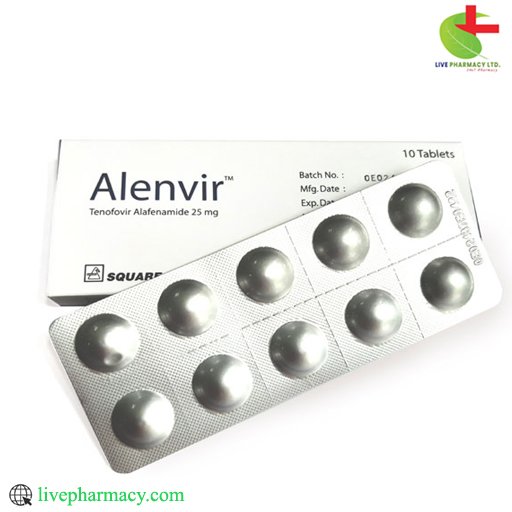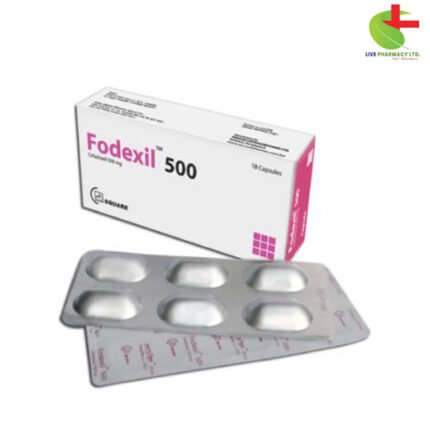Alenvir 25
900.00৳ Strip
- Alenvir: A trusted treatment for chronic hepatitis B virus (HBV) infection in adults with compensated liver disease.
- Key Ingredient: Tenofovir alafenamide, effectively inhibits HBV replication while maintaining mitochondrial integrity.
- Comprehensive Dosage Guidance: Ensuring safe administration for patients, with considerations for renal and hepatic impairments.
- Expert Advice and Quality Care: Count on us for managing hepatic viral infections with diligence and expertise.
 Brand
Brand
|
Square Pharmaceuticals PLC |
|---|---|
 Generics
Generics
|
Tenofovir Alafenamide |
Indications
Alenvir serves as a vital treatment for chronic hepatitis B virus (HBV) infection in adults with compensated liver disease. Acting as a nucleoside analog reverse transcriptase inhibitor, Alenvir targets the HBV with efficacy and precision.
Pharmacology
Tenofovir alafenamide, the cornerstone of Alenvir, operates as a phosphonamidate prodrug of tenofovir, a potent 2’-deoxyadenosine monophosphate analog. Utilizing a lipophilic nature, Tenofovir alafenamide seamlessly permeates primary hepatocytes through passive diffusion and hepatic uptake transporters like OATP1B1 and OATP1B3. Upon entry, it undergoes conversion to tenofovir, facilitated by carboxylesterase 1 (CES1). This metabolite, tenofovir diphosphate, effectively halts HBV replication by integrating into viral DNA, inducing termination of DNA synthesis. Tenofovir diphosphate’s selectivity ensures minimal interference with mammalian DNA polymerases, thus upholding mitochondrial integrity.
Dosage & Administration
Before initiating Tenofovir alafenamide therapy, HIV-1 testing is essential. The recommended dosage for adults is 25 mg (one tablet) taken orally once daily with food. Renal impairment necessitates no dosage adjustment unless the estimated creatinine clearance falls below 15 ml per minute or in cases of end-stage renal disease (ESRD) where chronic hemodialysis is employed. Hepatic impairment considerations vary based on the severity, with mild impairment permitting standard dosage while decompensated conditions advise against usage. Pediatric and geriatric usage recommendations align with safety and efficacy findings from clinical trials.
Interactions
Alenvir’s substrate status with P-glycoprotein (P-gp) and BCRP underscores the importance of vigilance regarding drug interactions. Co-administration with agents influencing P-gp activity may modulate Alenvir absorption, potentially impacting therapeutic outcomes. Renal function-affecting drugs pose additional considerations, as they may elevate tenofovir concentrations, necessitating cautious management to mitigate adverse reactions.
Side Effects
Common side effects of Alenvir include headache, stomach pain, tiredness, cough, nausea, and back pain. Adverse reactions such as lactic acidosis, severe hepatomegaly with steatosis, and renal impairment warrant close monitoring and appropriate clinical interventions.
Pregnancy & Lactation
Clinical data on Tenofovir alafenamide’s impact during pregnancy and lactation underscore the need for careful evaluation of risks and benefits. While potential birth defects have been noted, the developmental benefits of breastfeeding should be weighed against maternal clinical needs and potential adverse effects on the infant.
Precautions & Warnings
Severe acute exacerbations of hepatitis B post-Alenvir discontinuation and the risk of HIV-1 resistance in coinfected patients highlight the importance of adherence to treatment protocols. Renal function monitoring and vigilance for lactic acidosis and hepatotoxicity are imperative throughout the treatment course.
Overdose Effects
In the event of overdose, vigilant monitoring for toxicity indicators is crucial. General supportive measures, including hemodialysis, may be employed if necessary, given Alenvir’s efficient removal rate.
Therapeutic Class
Alenvir falls within the therapeutic class of medications targeting hepatic viral infections, specifically hepatitis B.
Storage Conditions
Proper storage of Alenvir below 30°C, shielded from light, and out of children’s reach ensures optimal efficacy and safety. Maintaining it in its original container is advised for integrity preservation.













Reviews
There are no reviews yet.